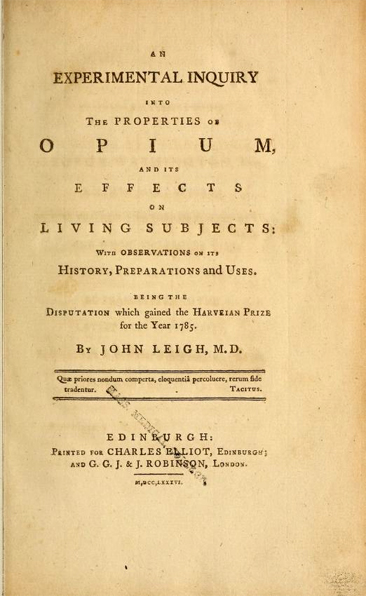ca. 1755–23 Dec. 1796

John Leigh, physician and legislator, was born in Virginia, the oldest son of Francis and Elizabeth Roscow Leigh. He was an executor of his father's will dated 1780 and probated in Norfolk County, Va., in 1782. Later going abroad for his medical training, he was very likely a student at Edinburgh. He does not appear on the list of graduates but may not have taken a degree. In 1785 Leigh won the Harveian Prize at Edinburgh for his disputation, "An Experimental Inquiry into the Properties of Opium and Its Effects on Living Subjects." This paper, dated 5 May 1785 and dedicated to George Washington, was published as a pamphlet in Edinburgh the following year. In his study Leigh carefully tested the composition of opium available in the pharmacies of London and Edinburgh and made detailed experiments of the effects of the drug on man and certain animals. Dr. Howard Kelly, the American medical historian, was impressed by this early research and commented later that while no discovery was made and no door to promise opened, "Leigh's work was the dawning of the critical experimental spirit destined to yield such a harvest in the next century."
On his return to America, Leigh married Mary Baker, the daughter of Benjamin Baker of South Quay, Southampton County, Va. He first appears in North Carolina records in June 1787, when he purchased a lot in Tarboro where he continued to reside until his death. His wife's sister was married to General Thomas Blount, the leading citizen of Tarboro, which perhaps had a bearing on his decision to locate there.
Leigh early began to take an active role in his new home. He represented Edgecombe County in the House of Commons from 1789 until his death, and for his last three terms he was speaker. He was a trustee of the Tarborough Academy in 1793 and the next year was one of the managers of the lottery for its benefit. Leigh also was a lay delegate to all four of the Tarboro conventions (1790–94) that made an abortive and premature attempt to establish the Episcopal church in North Carolina. He died in Raleigh while performing his legislative duties and was buried in the garden of the State Bank in Tarboro. In the medical field, Leigh did not live up to his early promise. He and his wife had no children. His three brothers also lived in Tarboro and died there.